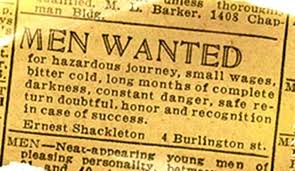Leadership Catalyst Blog
Business Leadership Lessons from Sir Ernest Shackleton and Antarctic Mike
All Blog Posts / 25.04.2016
Leadership can drive an organization to greatness or it can allow it to slowly crumble and die. We tend to attribute success to the hard work of an individual, but in reality it is the collective work of the team that allows a company to achieve great things. Chief Executives must make sure that they have the right people in the right roles to order to achieve the best possible results.
In order to really illustrate this concept for my Vistage members, I brought in Mike Pierce to speak to the business leadership lessons that we can all learn from Sir Ernest Shackleton.
 Shackleton is best known for saving the lives of his entire crew when disaster struck and their ship named the Endurance became trapped in pack ice and was slowly crushed before the party could make it to land. The crew escaped by camping on the sea ice until it melted and then launching the lifeboats to reach first Elephant Island and then ultimately sending an advanced crew to the inhabited island of South Georgia via a stormy ocean voyage of 720 nautical miles. This was Shackleton’s most famous exploit as he then had to return to Elephant Island to rescue the remainder of his crew.
Shackleton is best known for saving the lives of his entire crew when disaster struck and their ship named the Endurance became trapped in pack ice and was slowly crushed before the party could make it to land. The crew escaped by camping on the sea ice until it melted and then launching the lifeboats to reach first Elephant Island and then ultimately sending an advanced crew to the inhabited island of South Georgia via a stormy ocean voyage of 720 nautical miles. This was Shackleton’s most famous exploit as he then had to return to Elephant Island to rescue the remainder of his crew.
Remarkably Shackleton did not lose a single man during this brutal 2-year ordeal in the harshest conditions on the planet. Shackleton knew that he could trust his crew to deliver in their roles, and because of this and his leadership, everyone made it home safely. He knew that his team would preserver because the right men were in the right roles.
“Antarctic Mike” applies Shackleton’s lessons, along with his own experience endurance racing in the same arctic climate, directly to business leadership and helping Vistage owners ensure that they have the right team in place. My Vistage members came away with tangible insights that will help them bring their teams to the next level.
next level.
One of the biggest lessons was how to recruit the right people to join you. Many have seen the following ad that Shackleton allegedly placed in the London times to recruit his team, and generated over 5000 applications.
Antarctic Mike helped one of my members create a video version for his company in about 5 minutes. He asked him to tell a few customer success stories, and then we shot this short video that a person could put on their company website or LinkedIn.
Take less than 5 minutes and watch it for a clever low cost way to attract the right people to your organization.
Read More >>
5 Keys to Overcoming the Challenges of Discontinuous Innovation
All Blog Posts, Change, Vistage Peer Groups / 20.02.2014
The past decade is littered with cases of companies who were on top of their industry one year and then suddenly found themselves struggling to stay alive. Blackberry, Borders, and Blockbuster are three that come immediately to mind. When you read about them in the media or in HBR case studies, it is hard to fathom how they missed the new technology that put them on life support, if not out of business. The phrase “discontinuous innovation” refers to a paradigm shift in technology and/or the market structure of an industry. We can learn a lot from the examples of CEOs who have successfully navigated these disruptive changes.
Minneapolis Vistage member Jay Coughlan offers some insights into why change and organizational transformation is so difficult. He has led his company, XRS through 2 major transformations since 2007, and his story is summarized in a recent Minneapolis Star Tribune article. Below is the quote from the article that provides the background story.
“In 2009 the company, then called Xata, acquired Toronto-based Turnpike Global Technologies, which provided a trucking compliance solution that ran through a handheld device. Truckers and their companies must comply with myriad regulations, from logging hours driven and duty status to tracking state fuel taxes. The XRS service also helps improve performance by keeping track of maintenance schedules, fuel economy and more.
That $20 million acquisition would be the foundation of a complete shift in the company’s approach to providing logistics for the trucking industry. Xata used to be primarily a hardware company that installed a communications dome on top of truck’s cab and then tore apart the dashboard for a four-hour installation of a fixed-panel display and keyboard.
Now, with its mobile technology, it takes about 10 minutes to connect its XRS relay device and sync it with a wide variety of Android and Windows Mobile smartphones, rugged handheld devices and tablet computers that will automatically transmit vehicle and operator data directly to a management dashboard in the cloud. “
In hindsight, this migration from hardware to mobile technology seems like a no brainer, but with discontinuous innovation, there were three powerful stakeholders that made such a transformation almost impossible.
Existing customers – XRS had a large customer base on their legacy hardware with huge sunk costs who wanted them to continue to support that system. They are less than sympathetic to the need for XRS to shift resources from supporting their legacy systems to the development of the new technology.
Shareholders and Investors – Migrating to mobile required a change in business models from a large upfront equipment sale and installation to a subscription model with no upfront revenues. Moving from one to the other means a huge decline in revenues and profits over a year or more, which translates to meager cash flow, and short term losses. Even when you forecast it on paper, it is difficult to maintain the commitment of your board and investors when you are in the middle of it, especially when there is no guarantee of long term success.
Company Leaders and Employees – Migrating from a hardware solution to a software solution, to ultimately a mobile solution required totally different skillsets in engineering, software development, and sales and was only possible with a 70% turnover of employees. Without a clear vision and a burning platform for change it is impossible to drive the changes required to support this kind of transformation.
Based on many monthly coaching sessions and CEO peer meetings with Jay, I have identified 5 Keys that enabled XRS to overcome stakeholder resistance.
- Communicating a compelling vision of the power of being a first mover in his industry with mobile technology. The message needs to be simple and re-communicated over and over to remind people where we are going.
- Creating a “burning platform” (sense of urgency) around how iPads, tablets, and smart phones were discontinuous innovations that could render their current system obsolete – XRS needed to make the leap or be left in the dust. Again, given the dramatic changes required, people need to understand and be reminded that there is no going back to the old technology.
- Developing realistic quarterly forecasts showing the revenue lines of their two platforms and when the lines would cross and then producing quarterly results that are consistent with the forecast. This is especially difficult because there is no trend data to rely on and forecasts need to be frequently updated.
- Hiring new leaders that are equipped to drive the changes required in sales, technology, and operations. These new leaders need to represent the new culture you are creating and also integrate well with the former leadership team members that are still on board.
- Identifying the three critical priorities every quarter to drive the organization through the next phase of change. These priorities can change as you encounter bumps in the road along the way, and these changes need to be clearly communicated to all stakeholders.
Jay’s leadership in overcoming stakeholder resistance during XRS period of discontinuous innovation is an excellent example of the courage and resiliency required for CEOs to lead their companies through major transformation. I really enjoy having Jay in my Vistage CEO Advisory Group and his insight is extremely valuable to other group members who may be facing a similar rocky road. Vistage provides an excellent forum for CEOs to learn from other CEOs who have been where they are going.
Read More >>

